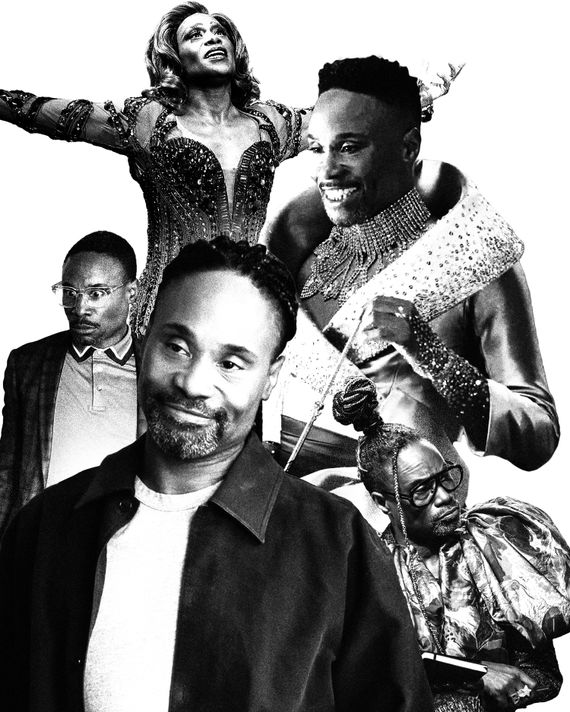
Billy Porter’s voice booms. It fills up a space, demanding to be listened to. It’s likely you know a mom with a voice like that — or a Black Pentecostal pastor who uses it to work his congregation into a sanctified frenzy. Porter speaks with a rasp that glides into clear, full-throated song, sometimes mid-sentence to emphasize a point. The voice has served him well on Broadway, where he debuted over 30 years ago. And as Pray Tell, the firecracker of a ballroom MC and an elder who rules with an always-on mic and a stern tongue on the FX show Pose.
In the second season, when a legend of the scene skips an important ACT UP protest, then struts into the ball in elaborate Marie Antoinette panniers, Pray becomes a pin in the balloon that is her moment of glory. “You are more concerned about winning a trophy than you are about our government spreading lies about us in an effort to kill us!” he says, his tone biting. “You want to know why they want us dead? Because we’re Black and we’re brown and we’re queer. They don’t give a shit about us. So we better start caring about ourselves. Show up for your lives. Wake up! ” The role crystallized Porter in the public eye: He is both a performer and someone with the power to reroute the discourse. And that’s why, this year, Porter received the fourth annual Vulture Festival Honorary Degree — which we award to those whose body of work is so remarkable that we just have to give them a prize.
As drag-cabaret performer Lola in Kinky Boots — he originated the role on Broadway — and the fairy godmother in the 2021 remake of Cinderella, the animation of his face is irrepressible: His brows furrow, relax, jump; his lashes flutter coquettishly; his eyes grow hooded with the veneer of disinterest. Yet even after Porter has won a Grammy, a Tony, and an Emmy — the first out Black gay man to do so — and begun to direct for film and TV, it can feel as if his best performance is that of himself. His red-carpet looks start conversations: Is a tuxedo–cum–ball gown not appropriate for a man at the Oscars? And in the face of anti-LGBTQ+ legislation, Porter has consistently personalized the issue. It is his body, that of a Black gay man living with HIV, that is up for legislation.
Porter once had dreams of becoming the “male Whitney Houston.” His voice filled rooms at 5 years old as he sang in his Pittsburgh church choir. Just as early on, his parents sent him to a psychologist because they feared he was not masculine enough. The church he thought of as a home antagonized him: A preacher pulled him aside and told him he would never be blessed because he was queer.
He found his way to Broadway, and shows like Smokey Joe’s Cafe and Grease, at a time of rampant industry homophobia and anti-Blackness. His roles were often caricatures. He capitulated to get by. But his voice remained, as evidenced by his 1997 debut album, Untitled; you can feel the Whitney inspiration in “Love Is on the Way,” a massive song that appears in The First Wives Club. Yet the box he could inhabit in public shrank. When he performed on The Rosie O’Donnell Show, his team told him not to talk too much lest he reveal that he was gay. His lovers in music videos were played by women. Every aspect of the star was scrutinized and warped until there was very little of Billy left.
He brings all of Billy to his projects this year — a pop album, Black Mona Lisa, and his role as a divorcing dad in the upcoming film Our Son. But most of all, he brings himself to Pray Tell, a loudmouth who pushes others to live fully while remaining guarded about his own HIV diagnosis. Like Porter, Pray is driven toward change by his disappointments. When Porter revealed his own HIV diagnosis in 2021, he said he’d “had a lot of time to sit back and observe the lights that came before me and burned out too soon. I’ve had a lot of time to investigate why, and the answer for me always circled back around to authenticity … The truth is the healing. And I hope this frees me.”
Toward the end of Pose, actor and role seem to merge as Pray Tell returns to his — and Porter’s — hometown of Pittsburgh after a terminal cancer diagnosis. There, he confronts old demons pulled from Porter’s personal experience, including childhood sexual abuse. In a cathartic scene, he attends Sunday service at the church of his youth in a suit of all white, the color of rebirth. He is called to the pulpit to sing. As he does, his eyes brim with tears; overcome with emotion, he reaches back and grasps the hand of the church’s pastor, his high-school lover who’s now married to a woman. The performance plays like therapy — for the character and for Porter. “Been through so many trials and tribulations,” he sings, almost howling, “but I thank you.”
Read About Past Winners
- Always Trust Mike Myers
- Lee Pace Stays Just Out of Reach
- Movies Were Better When Whoopi Goldberg Was in Them

